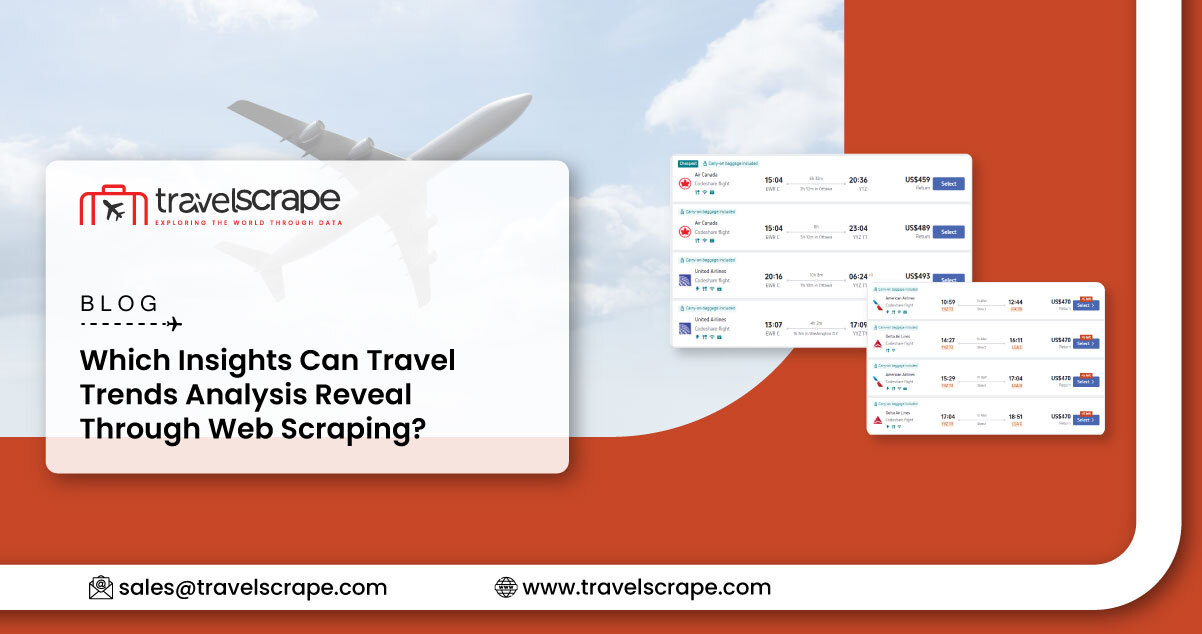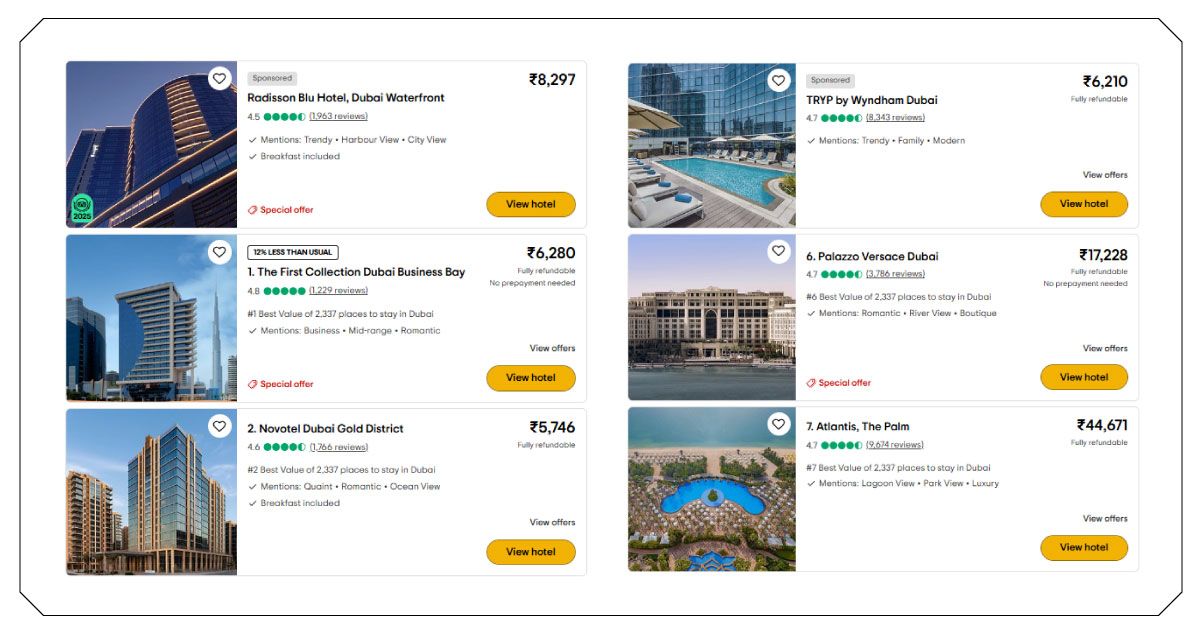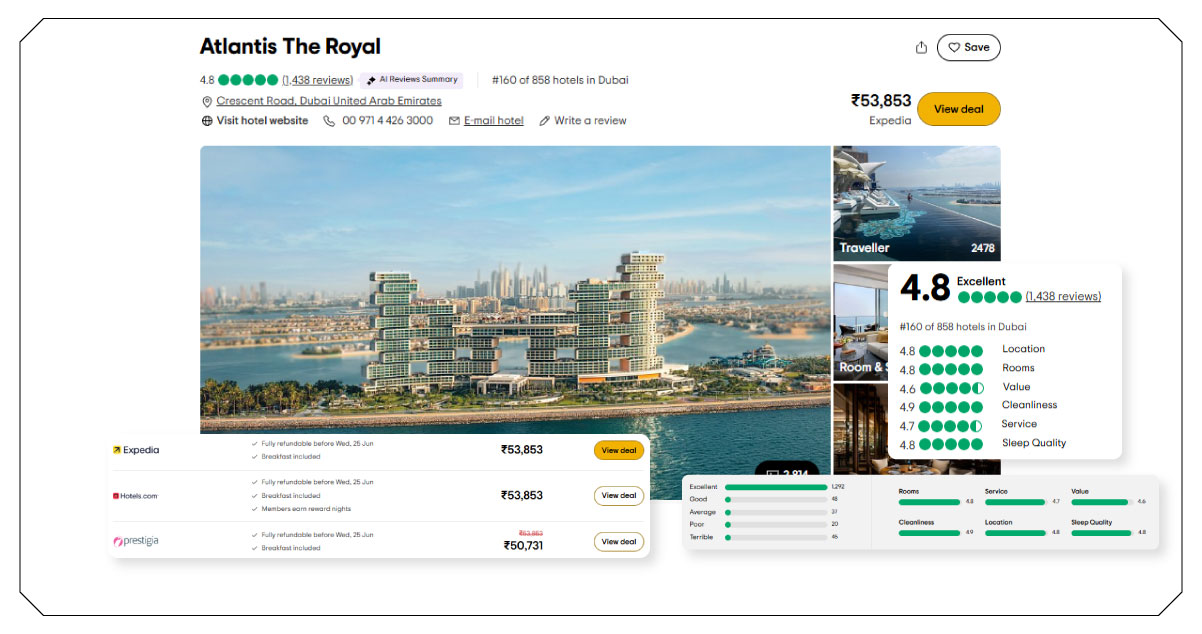Which Insights Can Travel Trends Analysis Reveal Through Web Scraping?

Introduction
The global travel industry generates massive amounts of data every second, from booking patterns and pricing fluctuations to customer reviews and seasonal preferences. Understanding this complex ecosystem requires sophisticated analytical approaches that can decode the intricate patterns within traveler behavior. Modern businesses increasingly use advanced Travel Trends Analysis methodologies to gain competitive advantages and make informed strategic decisions.
Web scraping has become a transformative tool for extracting publicly available travel data. By gathering and analyzing insights from diverse online platforms, businesses can now uncover hidden patterns in market behavior and customer choices. This strategic approach, enhanced with Vacation Rental Trend Data, empowers travel professionals to interpret evolving market dynamics better and adapt to changing consumer demands.
The Foundation of Modern Travel Intelligence

The travel industry operates in a highly dynamic environment where consumer preferences shift rapidly, and market conditions change based on countless variables. Traditional research methods often fall short of capturing real-time market movements and emerging trends. Innovative Web Scraping For Travel Data provides the foundation for building robust analytical frameworks that simultaneously process vast amounts of information from multiple sources.
Travel companies today face unprecedented challenges in understanding their target markets. Consumer behavior patterns are influenced by factors ranging from economic conditions and seasonal variations to global events and social media trends. Travel Data Extraction techniques enable businesses to gather comprehensive datasets that reflect these complex relationships and provide actionable insights for strategic planning.
Key benefits of implementing advanced data collection strategies include:
- Enhanced ability to predict market fluctuations and seasonal demand patterns.
- Improved understanding of competitor pricing strategies and market positioning.
- Better identification of emerging destinations and travel preferences.
- More accurate forecasting of customer behavior and booking trends.
Real-Time Market Monitoring and Trend Detection
Monitoring travel markets in real time represents a significant competitive advantage for businesses operating in this space. Real-Time Travel Trend Identification allows companies to respond quickly to changing market conditions and capitalize on emerging opportunities before their competitors. This proactive approach to market analysis has become essential for maintaining relevance in an increasingly competitive landscape.
Modern travelers make decisions based on current information, comparing prices, reading recent reviews, and evaluating real-time availability across multiple platforms. Companies that can track and analyze this information as it changes gain valuable insights into consumer decision-making processes. OTA Data Scraping techniques provide access to comprehensive datasets from online travel agencies, revealing patterns in booking behavior and preference shifts.
The implementation of sophisticated monitoring systems enables businesses to:
- Track competitor pricing strategies and promotional campaigns across multiple channels.
- Identify emerging travel destinations before they become mainstream.
- Monitor customer sentiment and satisfaction levels through review analysis.
- Detects seasonal patterns and anomalies in booking behavior.
Comprehensive Hotel Market Analysis

The hospitality sector generates enormous amounts of data through various online channels, from booking platforms and review sites to social media and promotional websites. Hotel Data Scraping methodologies enable comprehensive analysis of accommodation trends, pricing strategies, and customer satisfaction metrics across different market segments and regions.
Understanding hotel market dynamics requires analyzing multiple data points simultaneously, including occupancy rates, pricing fluctuations, amenity offerings, and customer feedback patterns. Advanced analytical techniques can process this information to identify market opportunities and optimize business strategies. Integrating Travel Market Insights from hotel data provides valuable intelligence for investment decisions and operational improvements.
Effective hotel market analysis encompasses several critical areas:
- Price optimization strategies based on demand patterns and competitor analysis.
- Customer satisfaction trends were identified through a review sentiment analysis.
- Market penetration opportunities in underserved geographical areas.
- Seasonal demand variations and capacity planning requirements.
Aviation Industry Intelligence and Price Monitoring
The airline industry represents one of the most complex and dynamic sectors within Travel. Prices fluctuate constantly based on numerous variables, including demand, fuel costs, seasonal patterns, and competitive pressures. Flight Price Trend Analysis provides essential intelligence for travel businesses and consumers seeking to understand and predict pricing patterns in this volatile market.
Airlines employ sophisticated revenue management systems that adjust prices based on real-time demand and competitive intelligence. Understanding these patterns requires comprehensive data collection and analysis capabilities that simultaneously process information from multiple sources. Vacation Rental Trend Data analysis often complements flight data analysis, as travelers frequently book accommodation and transportation together, creating interconnected demand patterns.
Key insights derived from aviation market analysis include:
- Optimal booking timing recommendations based on historical price patterns.
- Route profitability analysis and market opportunity identification.
- Competitive pricing intelligence and market positioning strategies.
- Seasonal demand forecasting and capacity planning optimization.
Alternative Accommodation Market Dynamics

The vacation rental market has experienced tremendous growth, fundamentally changing how travelers approach accommodation decisions. This sector requires specialized analytical approaches that can account for the unique characteristics of short-term rental properties, including location-specific factors, property amenities, and host management practices.
Understanding vacation rental trends involves analyzing data from multiple platforms and sources with distinct user bases and booking patterns. This market's complexity requires sophisticated Travel Data Extraction techniques that can process diverse data formats and normalize information for comprehensive analysis. Successful companies in this space leverage detailed market intelligence to optimize their offerings and identify growth opportunities.
Comprehensive vacation rental analysis typically includes:
- Geographic market penetration analysis and expansion opportunities.
- Property type preferences and amenity demand patterns.
- Pricing optimization strategies based on local market conditions.
- Seasonal demand variations and booking lead time analysis.
Integrated Platform Intelligence and Aggregator Analysis
Travel aggregators and comparison platforms are crucial in modern travel decision-making, serving as primary research tools for millions of travelers worldwide. Travel Aggregator Data provides unique insights into consumer search behavior, preference patterns, and decision-making processes that are unavailable through direct booking channels.
These platforms aggregate information from hundreds of suppliers, creating comprehensive datasets reflecting market trends and patterns. Analyzing this information requires sophisticated techniques to process large volumes of data while maintaining accuracy and relevance. The insights derived from aggregator analysis complement direct supplier data to create a complete picture of market dynamics.
The strategic value of aggregator intelligence includes understanding consumer research patterns, identifying market gaps, and optimizing distribution strategies. Companies leveraging Travel Market Insights from aggregator platforms can make more informed decisions about product development, pricing strategies, and marketing investments.
Strategic Implementation and Best Practices
Successful implementation of advanced travel analytics requires careful planning and execution. When designing their intelligence-gathering systems, organizations must consider technical requirements, data quality standards, and analytical capabilities. Integrating Real-Time Travel Trend Identification capabilities requires robust infrastructure and skilled analytical teams.
Best practices for travel intelligence implementation include establishing clear data governance policies, ensuring compliance with relevant regulations, and maintaining high data accuracy and reliability standards. Companies must also invest in analytical capabilities that transform raw data into actionable insights and strategic recommendations.
Practical implementation strategies typically involve:
- Establishing comprehensive data collection protocols and quality assurance procedures.
- Developing analytical frameworks that can process diverse data sources and formats.
- Creating visualization and reporting systems that support decision-making processes.
- Building organizational capabilities for data-driven strategic planning.
Technology Integration and Future Developments
The evolution of travel analytics continues to accelerate, driven by advances in artificial intelligence, machine learning, and data processing technologies. OTA Data Scraping techniques are becoming more sophisticated, enabling more comprehensive and accurate data collection from diverse sources.
Future travel intelligence developments will likely include enhanced predictive capabilities, real-time personalization, and more sophisticated market modeling techniques. Companies that invest in these capabilities today will be better positioned to capitalize on future opportunities and maintain competitive advantages in evolving markets.
Integrating advanced technologies enables more sophisticated analysis of Flight Price Trend Analysis and other market dynamics, providing deeper insights into the factors that drive pricing decisions and market behavior. These capabilities support more accurate forecasting and strategic planning across all travel industry sectors.
How Travel Scrape Can Help You?
We provide comprehensive travel data intelligence solutions that enable businesses to make informed decisions and maintain competitive advantages in dynamic markets. Our advanced Hotel Data Scraping and analytical capabilities deliver actionable insights that drive strategic success.
- Comprehensive Data Collection: Access real-time data from hundreds of travel websites, booking platforms, and aggregators across global markets.
- Advanced Analytics Platform: Sophisticated analytical tools that transform raw data into strategic insights and actionable recommendations.
- Custom Intelligence Solutions: Tailored data collection and analysis services to meet specific business requirements and market focus areas.
- Real-Time Monitoring Systems: Continuous market surveillance capabilities that alert clients to essential changes and emerging opportunities.
- Regulatory Compliance: Full compliance with data protection regulations and ethical data collection practices across all markets.
- Expert Consultation Services: Strategic guidance from travel industry experts who understand market dynamics and analytical best practices.
- Scalable Technology Infrastructure: Robust systems capable of processing large volumes of data while maintaining accuracy and reliability standards.
Conclusion
Monitoring travel markets in real time represents a significant competitive advantage for businesses operating in this space. Real-time travel Trend Identification allows companies to respond quickly to changing market conditions and capitalize on emerging opportunities before their competitors. This proactive approach to market analysis has become essential for maintaining relevance in an increasingly competitive landscape.
Innovative web scraping technologies provide the foundation for these advanced analytical capabilities, enabling businesses to simultaneously access and process data from Travel Aggregators and direct suppliers. Integrating Travel Industry Web Scraping methodologies with advanced analytics creates powerful intelligence platforms that support informed decision-making and competitive advantage development.
Ready to transform your travel business with advanced market intelligence? Contact Travel Scrape today to discover how we can provide the comprehensive data insights and analytical capabilities your organization needs to succeed in competitive travel markets.